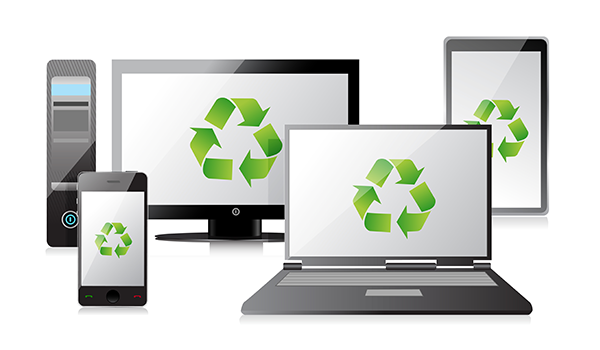In 2022, a total of 62 million tons of e-waste was generated worldwide, which is enough to fill 1.55 million 40-ton trucks. This amount of waste would be sufficient to encircle the equator if the trucks were arranged bumper-to-bumper. The United States alone contributed a staggering 7.2 million tons of this waste. With growing concerns about the environmental and health impacts of increasing e-waste, it is the responsibility of everyone to ensure its proper disposal.

What is E-waste?
E-waste, short for electronic waste, encompasses a wide range of discarded electronic devices and components. This includes both functional and non-functional items like monitors, laptops, batteries, printers, and tablets. The disposal of these electronics is crucial due to the harmful substances and materials they contain, which can pose serious environmental and health risks if not handled properly. It is essential to handle e-waste responsibly to protect our planet and safeguard our well-being.
Why is it a priority?
Protection of the Environment and Our Health
Proper disposal of these items is crucial as they should never be discarded in regular landfills. E-waste poses a significant concern due to the presence of chemicals and substances in most electronics that can lead to environmental and health risks. Moreover, these devices contain valuable materials like precious metals that can be recovered, ultimately conserving energy by reducing the need for mining or manufacturing new resources.
Security & Compliance
When considering the disposal of a device, it's important to be aware that it could contain sensitive information such as Personally Identifiable Information (PII), Personal Health Information (PHI), or social security numbers. To ensure compliance with NIST 800.88 standards, all data must be securely removed or the devices rendered 100% inoperable before disposal.
Federal and State Laws
As regulations surrounding e-waste management continue to evolve, more stringent laws are being enacted to ensure the proper disposal or repurposing of electronic equipment. Depending on the size of your organization, you may bear full responsibility for the secure handling of e-waste. Implementing a comprehensive e-waste program enables your business to trace the lifecycle of each device from its departure from your premises to its reuse or recycling, effectively closing the compliance loop and ensuring the responsible management of electronic waste.
Sustainable Solutions for E-waste Management
Reuse or Recycle
When e-waste is disposed of correctly, it can reduce the adverse impact it has on the environment and on those who process it. By promoting the concept of reusing electronics, the amount of e-waste sent for recycling is significantly reduced. If you can't reuse it, recycling is an alternative way of handling old electronics. Many of the materials, such as metals, glass, and plastics in electronic devices, can be recycled and used for other purposes.
E-waste Policy at Systems Engineering
At Systems Engineering, secure handling of client data and practicing good environmental stewardship are integral to our operations. As such, our policy removes us from the electronics recycling stream. Systems Engineering does not have the processing facility for a certified chain of custody, data destruction, wipe, or the disposal services required to comply with multiple federal and state regulations. If you are a Systems Engineering client and need more information, please get in touch with your Account Manager. They can introduce you to a nonprofit e-waste service for secure recycling options through giveIT.getIT., a certified electronics reuse and recycle program.
Benefits of Partnering with Certified E-Waste Vendors
By establishing a direct relationship with an R2 or RIOS certified e-waste vendor, your business can responsibly dispose of its e-waste, safeguard its data, and protect the environment from the hazards of e-waste for years to come. These certified vendors follow stringent standards for data security, ensuring that sensitive information is thoroughly destroyed and cannot be recovered by unauthorized parties. Additionally, they adhere to rigorous environmental regulations, preventing harmful substances found in electronics from contaminating our land, air, and water.
When you choose a certified e-waste vendor, you not only ensure compliance with legal requirements but also demonstrate your commitment to corporate social responsibility and sustainability by reducing your company's environmental footprint, enhancing its reputation, and contributing to a healthier planet for future generations.
* Data collected from the United Nations Institute for Training and Research, Sustainable Cycles (SCYCLE) Programme - The Global E-waste Monitor 2024
 Mark Benton is the Director of Product Management at Systems Engineering. He has over 30 years of experience in Information Technology and is responsible for overseeing the onboarding of new products and services for Systems Engineering and its customers.
Mark Benton is the Director of Product Management at Systems Engineering. He has over 30 years of experience in Information Technology and is responsible for overseeing the onboarding of new products and services for Systems Engineering and its customers.





